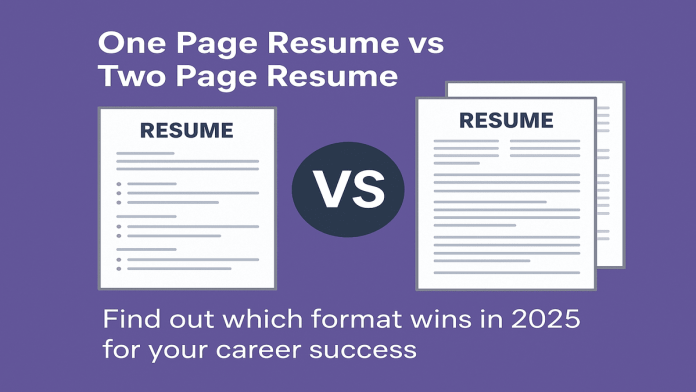Should I write my resume on one page or two?
If this question is bothering you, know that you have walked into a heated debate. The ideal length of a resume has been a topic open to endless discussion for over a decade, with not one conclusive answer. Hiring managers and industry experts have been divided on this motion for a while now. Some of them agree that a brief one-page resume makes it easier to stand out, while many strongly contend that a longer format is better at showcasing unique skills and experience.
The Myth About Resume Length
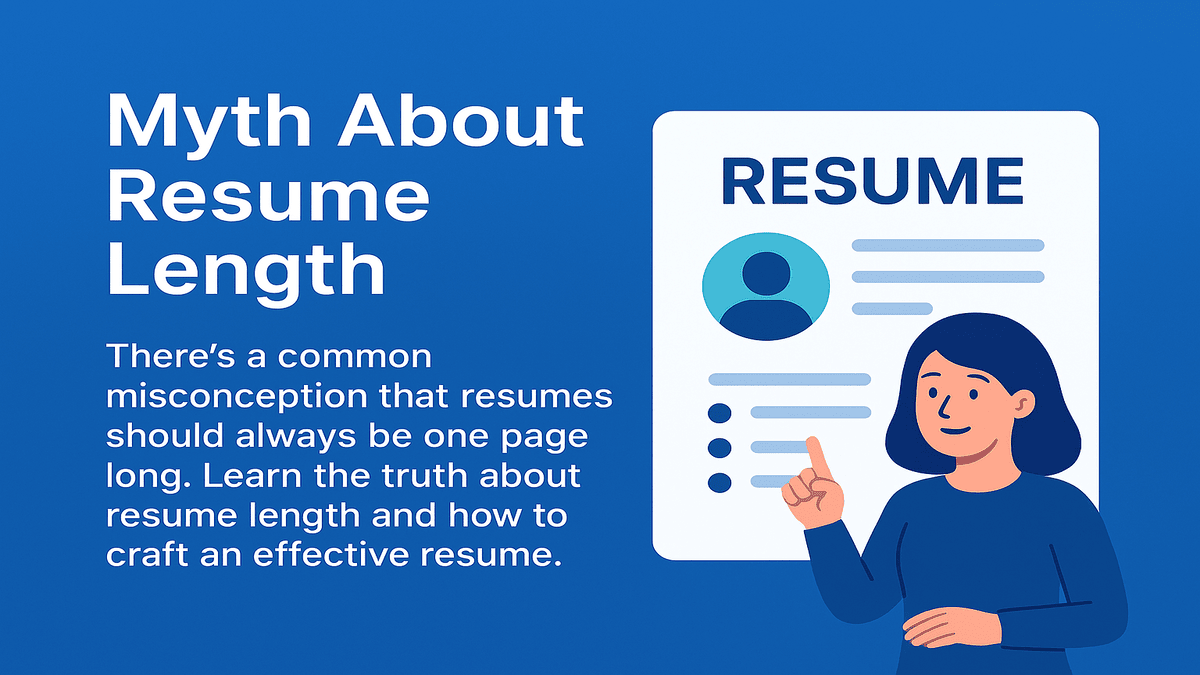
The idea of a perfect resume length is difficult to establish since there is no standardized scale for measuring an individual’s professional experience and expertise. For example, the resume of a salesperson at your neighborhood departmental store will not be the same as that of a salesperson with similar work experience at Walmart. Even within the same industry, the nature of your work and the skills that you learn vary. So, deciding between a one-page resume or a two-page resume is impractical in similar areas as it is in disparate industries and experience levels.
For a long time, a one-page resume was accepted as a standard and has been generalized as one of the crucial rules of resume writing. However, changing job requirements have shifted the trend towards a two-page resume. According to the 2024 Hiring Trends Survey by Resume Genius, around 54% of hiring managers prioritize a two-page resume.
Nonetheless, the right question here is whether the resume length matters or it would be more sensible to present your competencies and fit for the job optimally and with fewer words. In the next part, we will explore different cases where a one-page resume can be a champion and when it is wiser to use a second page or more.
What Makes a One-Page Resume the First Choice?
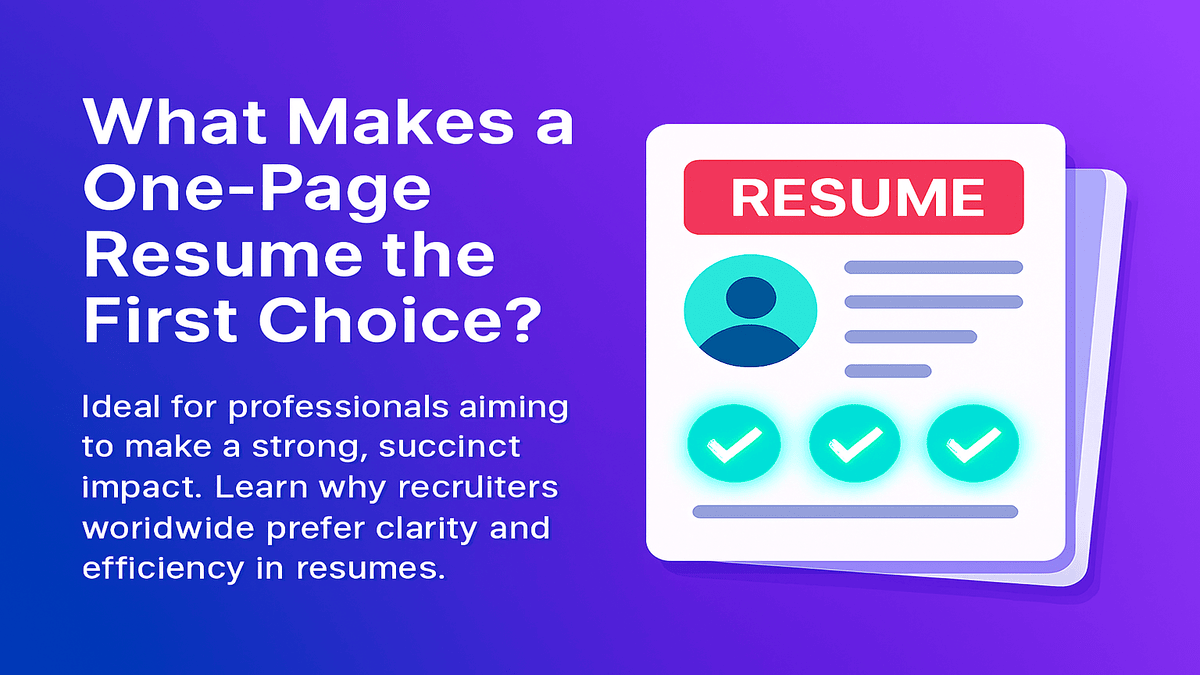
Using a one-page resume offers the following benefits:
- When you write a one-page resume, you comply with the most basic rule of resume creation that makes you a favourable candidate, as it can be quickly skimmed by the hiring team.
- A succinct description of your qualifications, skills, and achievements on a single page improves the readability that can grab and hold the attention of busy recruiters.
- A single-page resume lets you focus on quality over quantity by letting you weed out irrelevant details from your document.
What Are The Limitations of a One-Page Resume?
Although popular, there are some pitfalls in writing a one-page resume, such as:
- Condensing all the important information makes formatting on a single page more challenging, which can hamper legibility.
- You may fall short of space while including keywords to optimize your resume for the ATS.
- Summarizing extensive work history on one page can potentially undermine key accomplishments of seasoned professionals.
Who Should Use a One-Page Resume?
- Fresh graduate or undergraduate seeking an internship, part-time, or full-time job.
- Early or mid-career professionals equal to or with 8-10 years of experience.
- Freelancers or gig workers with short-term or diverse work histories.
- Career changers or professionals having gaps in their career can make good use of a one-page functional resume.
- Individuals with long working histories but limited areas of relevance and impact to show.
Points to Remember When Writing a One-Page Resume
For recruiters, a single-page resume is often simplistic and less overwhelming, but for a job seeker, it is a meticulous task. When writing a one-page resume, it is important to ensure that:
- All your credentials, skills, and achievements related to the job are precisely captured with digestible bullet points and strong action verbs.
- The content is not crammed, and the space is well utilized with a readable font type and size.
- Consistent formatting is maintained to guide the reader through your professional story.
- Keywords are effectively included in small frequencies so that your resume is tailored to the job description.
- Extraneous points or overused jargon are avoided to achieve optimal relevance.
What Makes a Two-Page Resume a Better Choice?
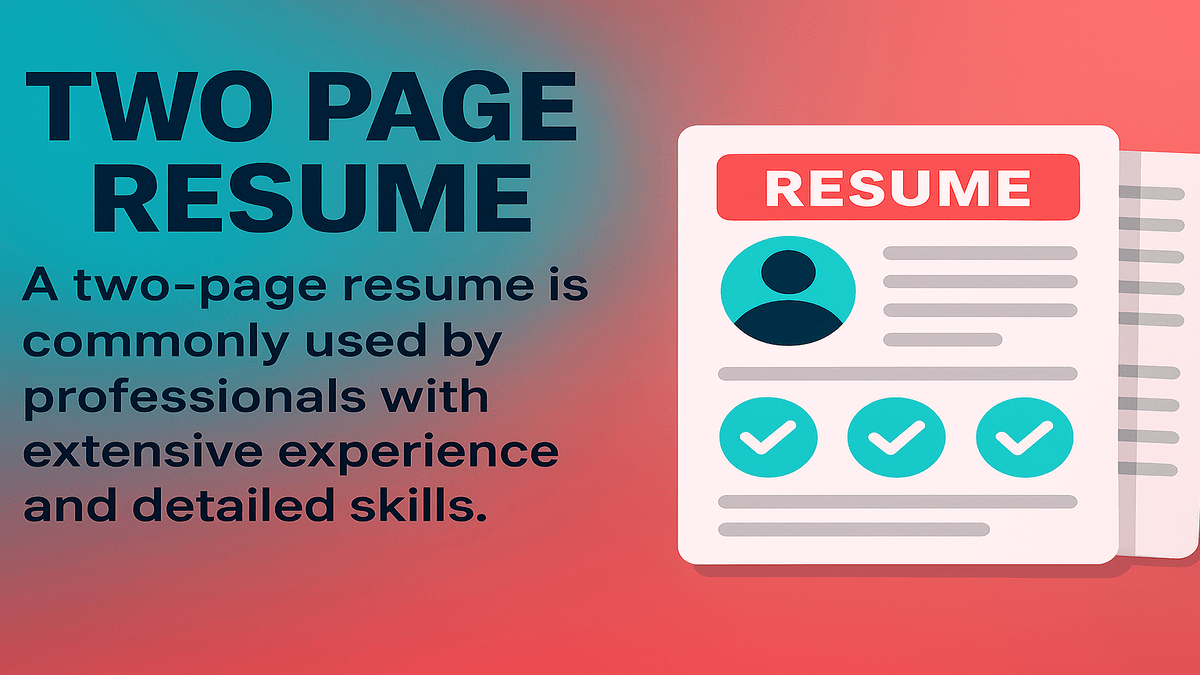
Advantages of a Two-Page Resume
- You get more space to include your comprehensive career history that correlates to the job you want, making sure no vital information is left uncovered.
- Your resume looks and sounds more natural once you incorporate just enough keywords that are dispersed in different parts, letting ATS filters scan them successfully.
- You can highlight your skills and achievements with more clarity by adding technical proficiencies, detailed project descriptions, volunteer work, leadership roles, or publications.
- Your resume looks neat with better formatting. For example, you can adjust margins, fonts, and alignment, and add more white space between text and sections.
Downsides of a Two-Page Resume:
Adding a second page to your resume also has certain flip sides
- Obviously, a resume takes a wee bit longer to read, requiring an extended attention span. Recruiters skimming your resume can miss some essential details if they lose interest or focus midway or towards the end.
- You may unconsciously pad details that may not contribute to the job, making you underqualified or overqualified for the job.
- Using an extra page signifies a lack of brevity, which is considered an essential skill among many hiring managers.
Who Can Benefit from a Two-Page Resume
- Experienced professionals beyond 8-10 years of working tenure can reasonably use a two-page resume to productively fill their long career trajectory.
- Freelancers who have worked with several clients and have a long list of portfolios under their belt, using an extra page to demonstrate their skills and outcomes is well justified.
- Senior-level professionals or executives applying for leadership roles are expected to highlight their professional milestones and managerial aptitude with enough detail.
- Individuals in Tech, Projects, and Consultancies having rich exposure in completing diverse cases and assignments.
- Academics and researchers require sufficient space to list their publications, presentations, or grants.
Must-Knows of Writing a Two-Page Resume
If you wish to use a two-page resume, you must structure it to maintain the reader’s interest. The primary purpose of using a longer format is to showcase your value in the best possible way. When building the resume, ensure that:
- Your career highlights are on the first page. Placing your key strengths at the start makes you noticeable and keeps the reader engaged.
- You did not create the second page unintentionally by spilling some text or sections from the first page. If you are covering just a few lines on the next page, which is less than one-third of the page, it may weaken your impression.
- The layout on both pages is identical. Keep the format consistent and visually well structured. Add page numbers and include your name on the second page as well.
- Rational continuity and balance are maintained on both pages by listing the most recent experiences first, followed by the earlier roles. The second page should also include all relevant experiences, down to the most recent job held.
- The resume does not exceed two pages unless you are in a late career stage, over 15+ years with a history of multiple roles and achievements. Resumes having more pages are termed as a curriculum vitae, having specific use cases.
What if You Need More Than Two Pages
Certain positions require you to submit a longer document, other than the regular resume. In some bureaucratic or public service roles, a detailed curriculum vitae is a prerequisite to verify education and evaluate expertise for high-stakes responsibilities. Moreover, seasoned professionals can also consider using a CV to highlight their illustrious career effectively.
A CV, acronym for Curriculum Vitae, is an in-depth record of the entire career of an individual, and includes an elaborate description of their education and professional achievements, such as formal degrees, skills, work experience, research papers, dissertations, conferences, training, licenses, honors, and other professional affiliations.
This format is typically used in specific industries and roles, such as in academics, healthcare, law, science, and other research fields. Unlike a resume that is constricted to 1-2 pages, a CV can have multiple pages. While a resume is acceptable in fast-paced businesses, a CV has its usage in traditional and research-intensive fields. Ultimately, the expectations of your field are key to deciding the appropriate length that best portrays your candidacy.
Tips to Optimize Resume Space
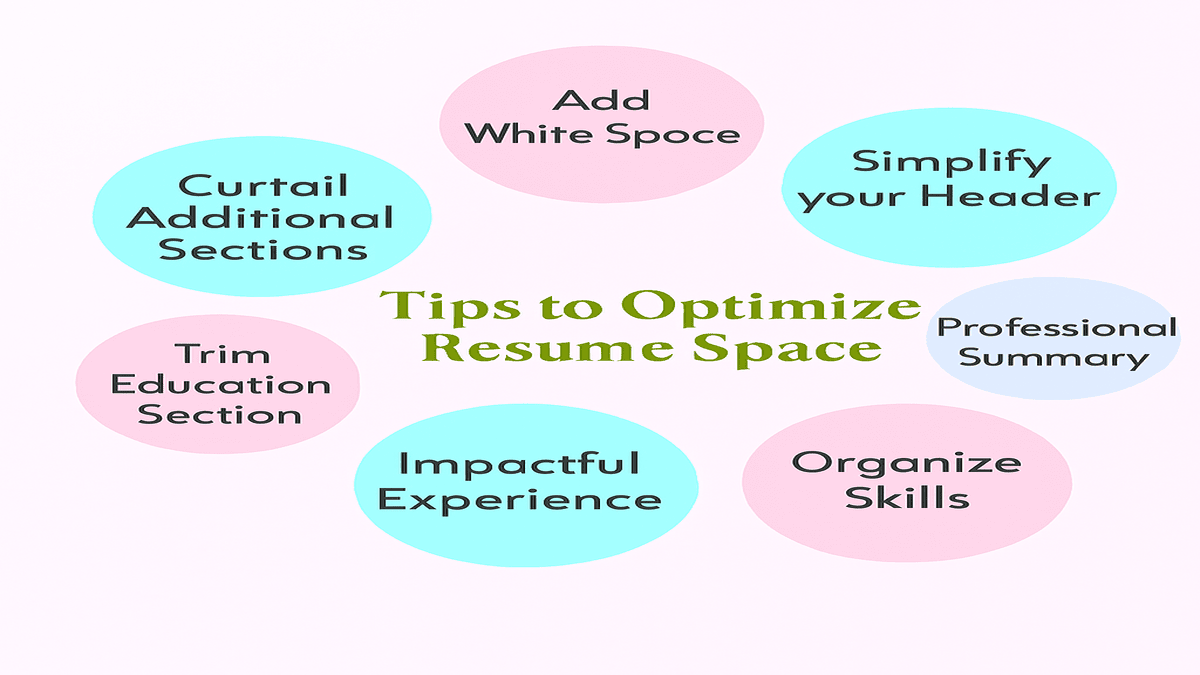
Concision is crucial, irrespective of the number of pages you are writing. Everything you put on your resume must be well planned. Here are some ideas to utilize the resume space in the most workable way.
Format to Save Space
Organize your resume to present better with a clean layout and standard fonts between 10-12 point size. Stretch the margins slightly to accommodate more without cluttering and get rid of text or graphics that consume extra space.
Limit the Header
Make sure that your header has essential contact details only. Do not include the full addresses of your location if it is not explicitly required, and draft your contact information on a single line rather than stacking it top-down.
Write a Brief Resume Summary
Long professional summaries can upset the reader to the point where they may not go beyond a few lines. Use as less as 2-3 lines to highlight your top achievements, skills, and career goals. Split the paragraph into bullet points if you wish to go further, but try to stick to between 3-4 concise points. Avoid using clichés rather emphasize measurable results and tailor them to the role.
Group Skills Together
Utilize the skills section to highlight your strengths specific to the job you want. Avoid listing basic skills and focus on the most relevant tools and abilities, which give a glimpse into your soft skills and technical proficiencies. Club related skills together using a two- or three-column layout instead of a vertical list.
Write a Brief and Impactful Experience
Your experience takes up most of your resume, so make it short and impressive. Arrange your experience section in reverse chronological order, listing the most relevant jobs and omitting unrelated roles. Write your achievements with metrics in strong 3-5 bullet points, avoid wordiness by removing fillers and using action verbs.
Check the example below:
Wordy version:
Was responsible for managing a team of ten people in order to ensure that all project assignments were completed on time and that client expectations were met in terms of quality and communication.
Short version
Led a 10-member team to deliver on time, high-quality projects.
Trim Your Education Section
List your qualifications according to your career stage. Add your highest degrees with relevant certifications only. Your high school details are not needed unless you are a recent graduate with no higher education. However, you can mention advanced courses that you are pursuing if it is relevant to the job you are applying for. Skip the scores unless requested, and follow a short format as in the example below:
BSC, Computer Science- Pune University,2023
Curtail your Additional Sections
Include an additional section only when they are really adding value to your desired role. Check the job description to see if it asks for certain certifications, training experience, or languages.
List short sections in a two-column format and keep entries brief using one-liners. Instead of writing “Received Employee of the Month in 2021, awarded by Regional Head – North East for being on time and taking no leaves.” simply state “ Employee of the Month- 2021, Category- Punctuality.
Conclusion
We can say that the length of a resume depends upon your unique career stage, industry standards, and the role. Some experts suggest that recent graduates or those early in their careers can benefit most from a one-page resume as it lets them establish themselves successfully, while those with longer work experience or specialized skills may find that a two-page resume can lay out their accomplishments adequately.
Moreover, tailoring your resume to the specific job is a growing concern, which means your content should align with the role, regardless of whether it fits on one or two pages. Remember, the goal is not just to fill the space but to present a compelling narrative. Whether you choose one page or two, check that your resume is well organised, easy to read, and free from unnecessary details.
FAQs for One-Page Resume Vs Two-Page Resume
- Is a one-page resume still preferred in 2025?
A one-page resume works best for students, freshers, and professionals with under 8–10 years of experience. It keeps things concise and recruiter-friendly. - When should I use a two-page resume?
A two-page resume is ideal for senior professionals, managers, or specialists with 10+ years of experience who need space to show achievements, projects, and leadership roles. - Do recruiters actually read two pages?
Recruiters usually scan the first page first, but if your second page adds measurable impact, projects, or relevant skills, they will look at it. - Which format is better for ATS (Applicant Tracking Systems)?
Both one-page and two-page resumes work in ATS as long as they’re well-structured, keyword-optimized, and free from complex formatting. - What’s the golden rule for 2025?
Go for one page if your career is early-stage and achievements are limited. Opt for two pages if your experience and skills justify the space.
Read More: How to Create a Resume? Step-by-Step Guide for Job Seekers
Resume Trends in 2025 : Everything You Need To Know About Modern Resume Writing

